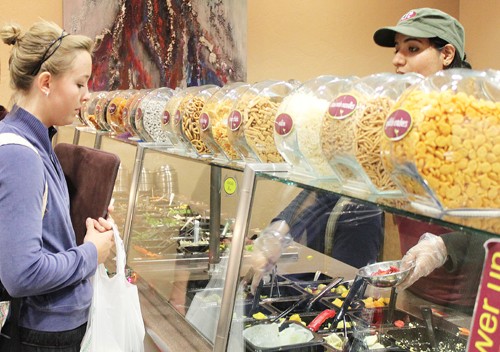Deciding what to eat on campus can seem difficult for health-conscious students, but not if they make smart choices, campus nutrition experts said.
Students have a perception of restaurants that are healthier than others, but it all depends on what you order, said Victoria Christie, assistant director of dining services.
“”I feel very strongly that each and every one of our restaurants is healthy,”” she said. “”It’s all about consumer choices and being an educated consumer.””
Dining Services provides dining brochures in the student unions that outline the low-fat, low-carb, vegetarian, vegan and gluten-free options available to students, Christie said. All of the food served in the unions is made by Dining Services, so they know exactly what goes into each item, she said.
“”We have a responsibility to our public to offer everyone something that they might want and that would be suitable for their own personal needs,”” she said.
Sometimes students determine their eating habits based on what they are used to eating at home or which options are cheaper, said Gale Welter, a registered dietitian with Campus Health.
She said every university suffers from the “”boredom factor”” with students who eat on campus frequently running out of things they want to eat.
Restaurants where students can “”self-direct,”” such as On Deck Deli and Core, allow them to customize healthier meals if they choose, she said.
Welter advised that students avoid fried food and sugary beverages like soda, lemonade and coffee drinks, and incorporate foods with color, such as fruits and vegetables in every meal. She also recommended that meals contain three different food groups in order to stabilize blood sugar and decrease cravings.
“”I am a big believer in moderation, and no food is bad food,”” Welter said. Students can find food labels for meals on campus by visiting www.union.arizona.edu/dining/nutritioninfo/index.php, and then choosing the restaurant and food item.
Although she said it is difficult to give specific numbers because everyone is different, Welter gave some general guidelines about target numbers for food labels.
She recommended that sandwiches contain 500 calories or less with about 20 to 25 grams of protein. For a dinner, she recommended the foods contain 700 calories or less. Welter also said foods should not contain more than three grams of fat for every 100 calories.
Welter said many students think that if they can not eat a perfect diet, they should not even bother trying to be healthy.
“”It doesn’t have to be perfect, but better, and better is there,”” she said.
In Welter’s opinion, students are more concerned about gaining and losing weight than about eating healthy.
“”Everyone has in the back of their mind some awareness (about health), but I don’t know if everyone believes that food makes that much of a difference,”” she said.
Student opinions varied regarding dining options on campus.
Jenny Ly, a biology freshman, lives in the dorms and said she eats on campus most of the time and that campus could have more healthy options.
“”Sometimes I feel guilty after eating some of the food,”” she said.
Ly said that as an athlete, she knows about health.
“”I balance it with being active,”” she said. She plays intramural volleyball, tennis and basketball.
On the other hand, Eric Szablinski, a materials science and engineering senior, said eating healthy on campus is not a priority for him.
“”If I wanted to, I could eat healthy at home,”” he said.
Welter said it is important for students to eat healthy in college.
“”Food habits, while not addictions, become very ingrained,”” she said. “”(Students are) setting the stage for the rest of their lives based on their own decisions.””









